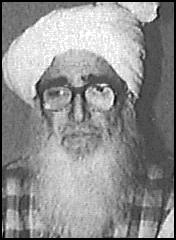Abdul Haq عبد الحق | |
|---|---|
 | |
| 1st Chancellor of Darul Uloom Haqqania | |
| In office 23 September 1947 – 7 September 1988 | |
| Succeeded by | Sami-ul-Haq |
| Member of the National Assembly | |
| In office 14 April 1972 – 10 January 1974 In office 26 March 1977 – 5 July 1977 In office 20 March 1985 – 29 May 1988 | |
| Constituency | Peshawar Division |
| Personal details | |
| Born | 11 January 1912 Akora Khattak, NWFP, British India (present-day Khyber Pakhtunkhwa, Pakistan) |
| Died | 7 September 1988 (aged 76) Peshawar, NWFP, Pakistan (present-day Khyber Pakhtunkhwa, Pakistan) |
| Nationality | Pakistani |
| Political party | Jamiat Ulema-e-Islam |
| Children | Sami-ul-Haq (son) |
| Alma mater | Darul Uloom Deoband |
| Occupation | Islamic scholar, Teacher, Politician |
| Awards | Sitara-i-Imtiaz (Star of Distinction) by the President of Pakistan in 1981 Honorary PhD in Divinity, University of Peshawar |
| Part of a series on the |
| Deobandi movement |
|---|
 |
| Ideology and influences |
| Founders and key figures |
|
| Notable institutions |
| Centres (markaz) of Tablighi Jamaat |
| Associated organizations |
Abdul Haq (Urdu: عبدالحق, Pashto: عبدالحق; 11 January 1912 – 7 September 1988), also known as Abdul Haq Akorwi was a Pakistani Deobandi Islamic scholar and the founder, chancellor, and Shaykh al-Hadith of the Islamic seminary Darul Uloom Haqqania. He also served as vice-president of Wifaq ul Madaris Al-Arabia, Pakistan.[1] He was involved in politics as a member of the political party Jamiat Ulema-e-Islam. He served three times in the National Assembly of Pakistan and was an active proponent of the Khatme Nabuwwat movement.
Abdul Haq completed his religious education at Darul Uloom Deoband in Deoband, India. He taught at Deoband for four years until difficulties arose due to the independence of Pakistan. In 1947, he founded Darul Uloom Haqqania in Akora Khattak, one of the first Islamic seminaries to be established in Pakistan. He taught hadith at the madrasah for the rest of his life and was well known by the title "Shaykh al-Hadith".[2]
His son, Sami ul Haq, succeeded him as chancellor of Darul Uloom Haqqania. Abdul Haq's sermons have been published by his son in two volumes containing over 1,300 pages, entitled Da`wat-i Haq.[3]
- ^ "وفاق المدارس العربيہ پاکستان". www.wifaqulmadaris.org. Archived from the original on 12 August 2020. Retrieved 21 February 2022.
- ^ Cite error: The named reference
jamiawas invoked but never defined (see the help page). - ^ Jaan, Syed Hidayat Ullah; Ullah, Haris; Jaan, Syed Latif Ullah (31 March 2022). "An over view about Maulana Abdul Haqq's educational, social and political contributions: مولانا عبدالحق ؒکی علمی،سماجی اور سیاسی خدمات کاتحقیقی جائزہ". Al Khadim Research Journal of Islamic Culture and Civilization. 3 (1): 160–168. doi:10.53575/arjicc.v3.01(22)u12.160-168. ISSN 2710-0235.